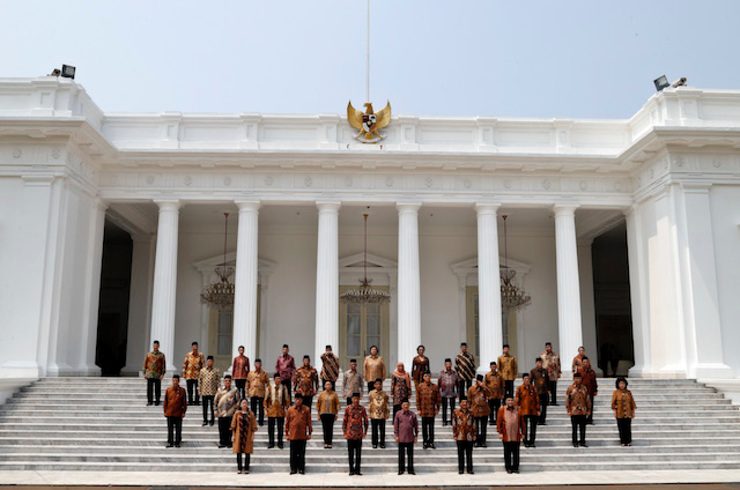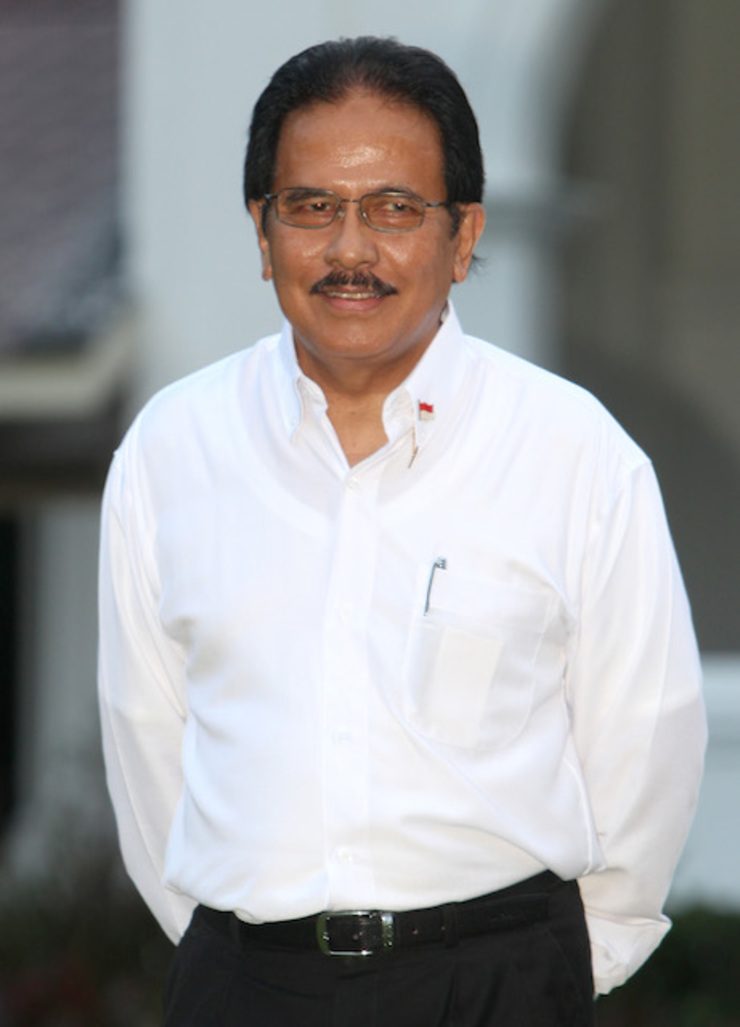SUMMARY
This is AI generated summarization, which may have errors. For context, always refer to the full article.

JAKARTA, Indonesia – Among the 34 new Indonesian ministers inaugurated on Monday, October 27, there are a handful of technocrats that now compose President Joko “Jokowi” Widodo’s economic team.
These new ministers are capable, experts say, but it remains to be seen whether they would be up to the huge task of reviving a slowing economy in the face of global economic uncertainty and fiscal constraints.
Who’s who?

For the top two economic posts, Jokowi went with technocrats respected for their capabilities but who do not have reputations as reformists. Sofyan Djalil, 61, a former state enterprise minister in the previous administration who holds a doctorate from Tufts University in the United States, will head the coordinating ministry for the economy. Deputy finance minister Bambang Brodjonegoro, 48, a former University of Indonesia professor, has been promoted to the post of finance minister.
In a welcome move, Jokowi appointed Sudirman Said, 51, an anti-corruption campaigner and the president of the army weapons manufacturer PT Pindad, to head the Energy and Mineral Resources Ministry. Said’s appointment signals the president’s determination to clean up the ministry after it was recently hit by a high-profile corruption scandal. (The portfolio, though, was moved to the newly established Coordinating Ministry for Maritime Affairs – a key post given Jokowi’s new maritime focus.)
The rest of the economic appointees are either business people or members of political parties that supported Jokowi in the July presidential election, which doesn’t reflect well on the president who campaigned that he would not trade ministerial seats for political support. (See the table below and read: Jokowi’s ‘working’ cabinet receives cautious welcome)
The benchmark Jakarta Composite Index was down nearly 1% to close 5,024.29 on Monday, October 27, signaling the market’s lack of enthusiasm about the cabinet line-up.
Competent, but…
“All the individuals are competent in their own fields but the question is whether they can work together to accelerate economic development so that Indonesia doesn’t get stuck in the middle-income trap,” said Ari Kuncoro, an economics lecturer at the University of Indonesia.
Indonesia, a member of the G20 group of major economies, has seen economic growth fall from above 6% to around 5% in the past year.
Ari said the government’s constrained ability to increase expenditures to boost the economy was one of the Jokowi administration’s biggest challenges.
‘The government needs to set priorities because fiscal space is extremely limited’
– Ari Kuncoro, University of Indonesia economics lecturer
Southeast Asia’s largest economy spends much of its budget on fuel subsidies, but the new government’s plan to raise the costs at the pumps early to relieve the fiscal burdens has sparked controversy and could prove the end of Jokowi’s honeymoon period.
“The government needs to set priorities because fiscal space is extremely limited,” Ari said.
But Andry Asmoro, senior economist at Bank Mandiri, said Bambang was a fiscal expert who was expected to able improve fiscal policy.
“Bambang Brodjonegoro is experienced in fiscal management and the minister of state enterprises (Rini Soemarno) is well-versed in corporate nitty-gritty, so I think this team can work fast,” he said.
Priorities
Indonesia’s decaying infrastructure is a major impediment to growth, but the previous governments’ efforts to boost development of power plants, roads, airports and seaports were less than successful.
“Infrastructure is key. If we can fix infrastructure, other sectors will also improve,” Ari said.
Another challenge is global economic uncertainty, with China’s slowing economy affecting Indonesia’s commodity exports, Andry said.
“Indonesia needs to improve its manufacturing industry so that we can reduce reliance on imports and become more competitive internationally,” Andry said.
“So when we achieve economic growth of 7% or more there won’t be an explosion of imports, which could put the rupiah under pressure,” he said.
Not quite reformist
However, Aaron Connelly, an Southeast Asia analyst at the Lowy Institute for International Policy, said Jokowi had continued the practice of appointing a trusted technocrat to the key finance portfolio, while giving political supporters microeconomic posts like trade and industry.
“It is a dichotomy that soothes markets watching macroeconomic indicators for signs of weakness, but frustrates foreign investors who are made to navigate a complex maze of protectionist legislation and regulation,” he wrote on the Interpreter
Sri Adiningsih, an economist at Gadjah Mada University, questioned the selection of Bambang as finance minister, considering Jokowi’s promise of a break from the past.
“Bambang is part of the system while Jokowi wants change,” she said.
“The question is: Is Pak Bambang capable of effecting change while he has been designing our fiscal system?
“There are many complex problems and we’re awaiting breakthroughs from Bambang,” she said.
Jokowi’s economic team:
| Ministry | Name | Background |
| Coordinating Ministry for the Economy | Sofyan Djalil | He was a state-owned enterprises minister under President Susilo Bambang Yudhoyono’s second term, and communications and information technology minister under the first term. Most recently, he was president commissioner of Trimegah Securities. His appointment has mostly been welcomed by analysts. |
| Ministry of Finance | Bambang Brodjonegoro | He was dean of the School of Economics of the University of Indonesia from 2005‐2009. He joined the Ministy of Finance in January 2011 as acting head of fiscal policy office, and was appointed deputy finance minister on October 3, 2013. He is considered a fiscal policy expert. |
| Ministry of State-Owned Enterprises | Rini M Soemarno | A confidante of former President Megawati Sukarnoputri, Rini was the head of Jokowi’s transition team. She was the industry and trade minister when Megawati was president and she used to be the president director of one of Indonesia’s most successful companies, PT Astra Internasional. She has been labeled one of Jokowi’s more controversial appointments. |
| Ministry of Industry | Saleh Husin |
He is a former lawmaker from the People’s Conscience Party (Hanura), one of the parties in Jokowi’s Great Indonesia coalition, making him one of the political appointees. But he has experience in business, having served as director or commissioner of various companies including logistics company Sapta Kencana Buana, drinking water company PT Ades Alfindo Putra Setia, and others. He also holds an economics degree from Jakarta’s Krisnadwipayana University. |
| Ministry of Trade | Rachmat Gobel |
He inherited the Gobel business empire, and now heads the Panasonic Gobel Group – a joint venture between Gobel Group and Panasonic Corporation (formerly Matsushita Electric Industrial Co., Ltd.). He also holds high-level positions in other companies, serves as the vice chairman of the Board of Advisors of the Indonesian Chamber of Commerce and Industry (KADIN), and was a member of Yudhoyono’s National Innovation Committee (KEN). |
| Ministry of Energy and Mineral Resources | Sudirman Said |
He is the president director of state-owned army weapons manufacturer maker Pindad, but is known for being an anti-corruption campaigner who co-founded the Indonesian Transparency Society (MTI). He also has experience in the industry he will oversee, having served as a top executive at oil contractor PT Petrosea and energy and mining company PT Indika Energy. He was also reportedly among the candidates to become director of state oil company Pertamina in 2008. (This portfolio used to be under the Coordinating Ministry for the Economy but has now been moved to the newly established Coordinating Ministry for Maritime Affairs) |
– Rappler.com
Add a comment
How does this make you feel?
There are no comments yet. Add your comment to start the conversation.